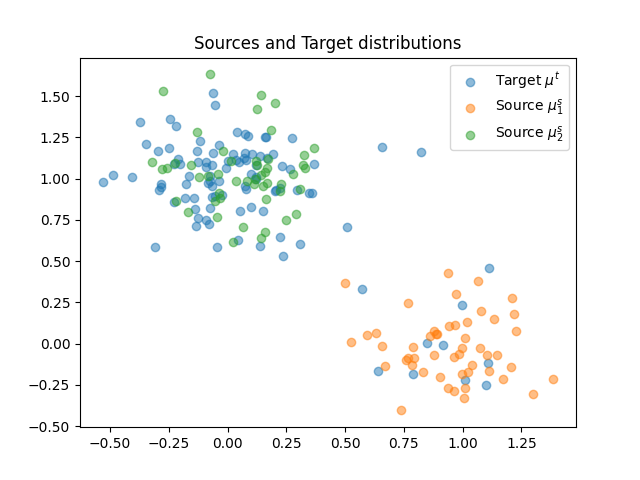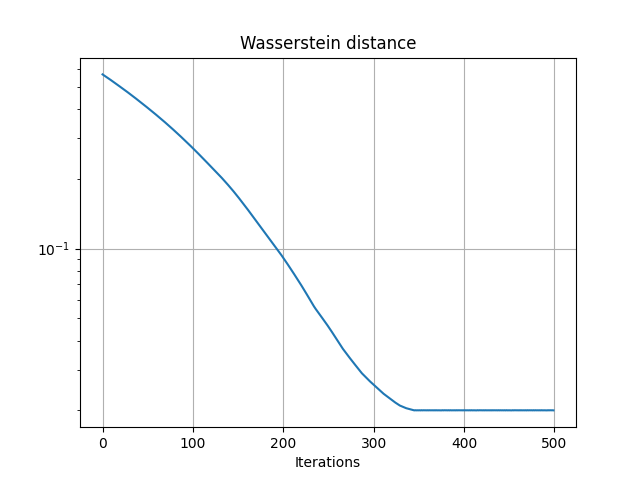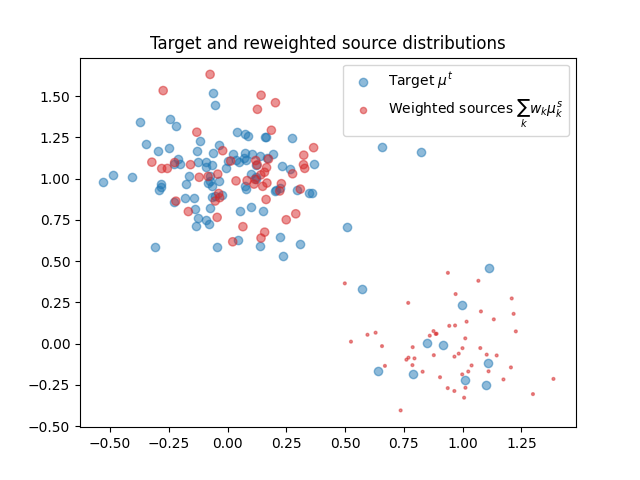Note
Go to the end to download the full example code.
Wasserstein unmixing with PyTorch
Note
Example added in release: 0.8.0.
In this example we estimate mixing parameters from distributions that minimize the Wasserstein distance. In other words we suppose that a target distribution \(\mu^t\) can be expressed as a weighted sum of source distributions \(\mu^s_k\) with the following model:
where \(\mathbf{w}\) is a vector of size \(K\) and belongs in the distribution simplex \(\Delta_K\).
In order to estimate this weight vector we propose to optimize the Wasserstein distance between the model and the observed \(\mu^t\) with respect to the vector. This leads to the following optimization problem:
This minimization is done in this example with a simple projected gradient
descent in PyTorch. We use the automatic backend of POT that allows us to
compute the Wasserstein distance with ot.emd2 with
differentiable losses.
# Author: Remi Flamary <remi.flamary@polytechnique.edu>
#
# License: MIT License
# sphinx_gallery_thumbnail_number = 2
import numpy as np
import matplotlib.pylab as pl
import ot
import torch
Generate data
nt = 100
nt1 = 10 #
ns1 = 50
ns = 2 * ns1
rng = np.random.RandomState(2)
xt = rng.randn(nt, 2) * 0.2
xt[:nt1, 0] += 1
xt[nt1:, 1] += 1
xs1 = rng.randn(ns1, 2) * 0.2
xs1[:, 0] += 1
xs2 = rng.randn(ns1, 2) * 0.2
xs2[:, 1] += 1
xs = np.concatenate((xs1, xs2))
# Sample reweighting matrix H
H = np.zeros((ns, 2))
H[:ns1, 0] = 1 / ns1
H[ns1:, 1] = 1 / ns1
# each columns sums to 1 and has weights only for samples form the
# corresponding source distribution
M = ot.dist(xs, xt)
Plot data

<matplotlib.legend.Legend object at 0x7fd8dbef9390>
Optimization of the model wrt the Wasserstein distance
# convert numpy arrays to torch tensors
H2 = torch.tensor(H)
M2 = torch.tensor(M)
# weights for the source distributions
w = torch.tensor(ot.unif(2), requires_grad=True)
# uniform weights for target
b = torch.tensor(ot.unif(nt))
lr = 2e-3 # learning rate
niter = 500 # number of iterations
losses = [] # loss along the iterations
# loss for the minimal Wasserstein estimator
def get_loss(w):
a = torch.mv(H2, w) # distribution reweighting
return ot.emd2(a, b, M2) # squared Wasserstein 2
for i in range(niter):
loss = get_loss(w)
losses.append(float(loss))
loss.backward()
with torch.no_grad():
w -= lr * w.grad # gradient step
w[:] = ot.utils.proj_simplex(w) # projection on the simplex
w.grad.zero_()
/home/circleci/project/examples/backends/plot_unmix_optim_torch.py:127: UserWarning: Converting a tensor with requires_grad=True to a scalar may lead to unexpected behavior.
Consider using tensor.detach() first. (Triggered internally at /pytorch/torch/csrc/autograd/generated/python_variable_methods.cpp:836.)
losses.append(float(loss))
Estimated weights and convergence of the objective

Estimated mixture: [0.09980706 0.90019294]
Text(0.5, 23.52222222222222, 'Iterations')
Plotting the reweighted source distribution
pl.figure(3)
# compute source weights
ws = H.dot(we)
pl.scatter(xt[:, 0], xt[:, 1], label="Target $\mu^t$", alpha=0.5)
pl.scatter(
xs[:, 0],
xs[:, 1],
color="C3",
s=ws * 20 * ns,
label="Weighted sources $\sum_{k} w_k\mu^s_k$",
alpha=0.5,
)
pl.title("Target and reweighted source distributions")
pl.legend()

<matplotlib.legend.Legend object at 0x7fd910dc0f40>
Total running time of the script: (0 minutes 1.522 seconds)